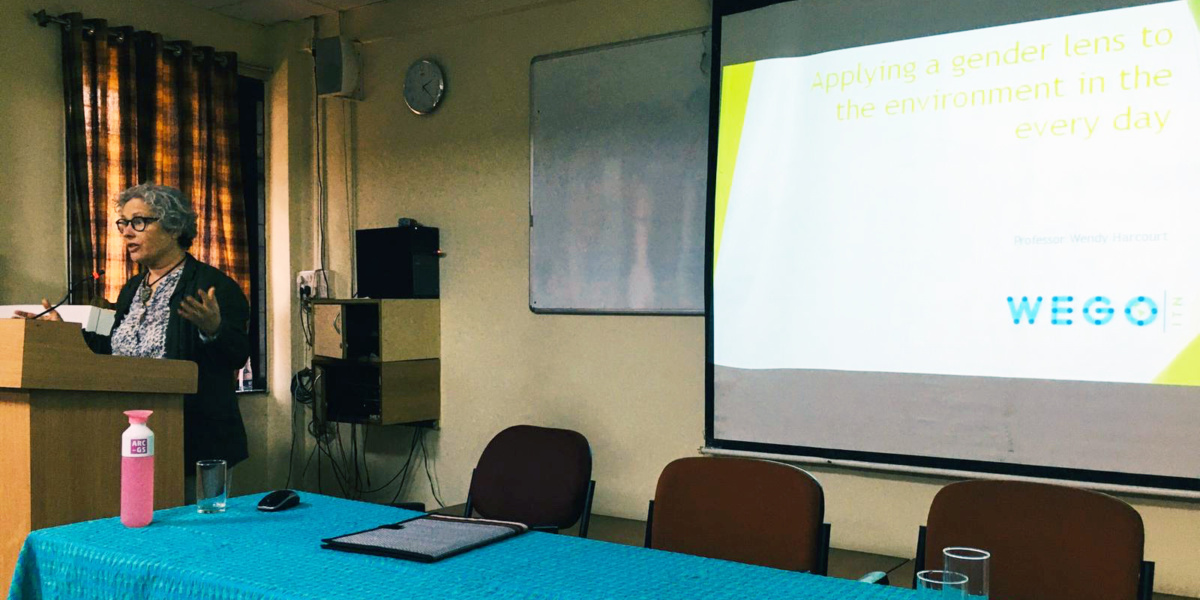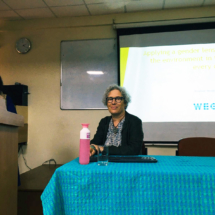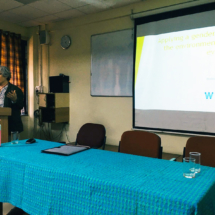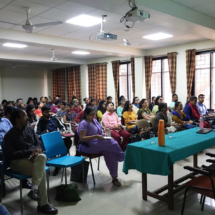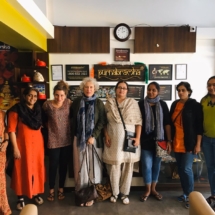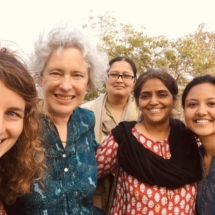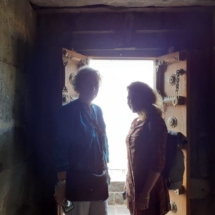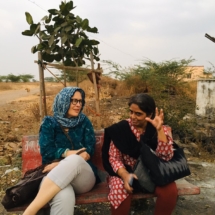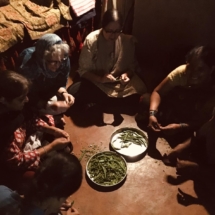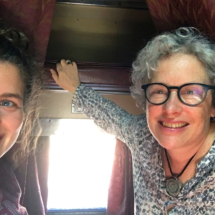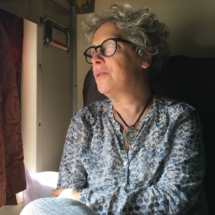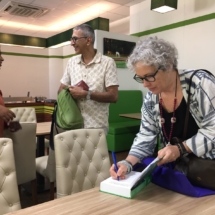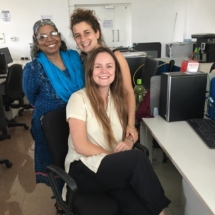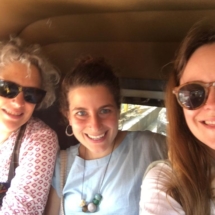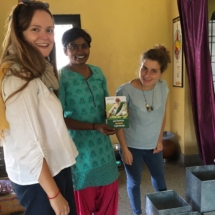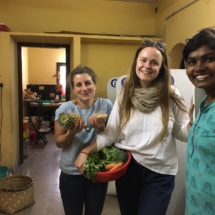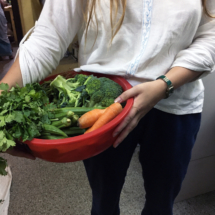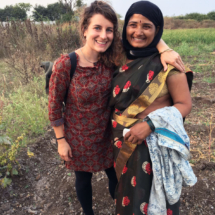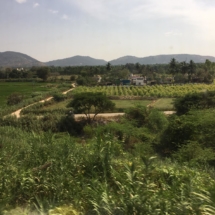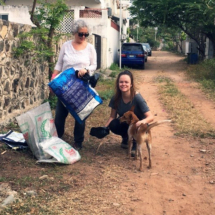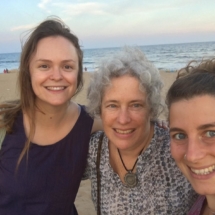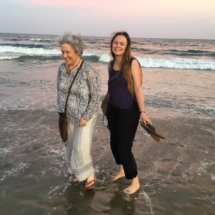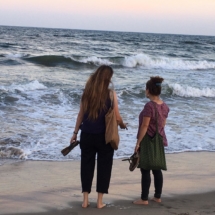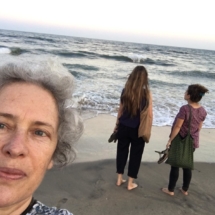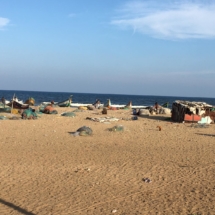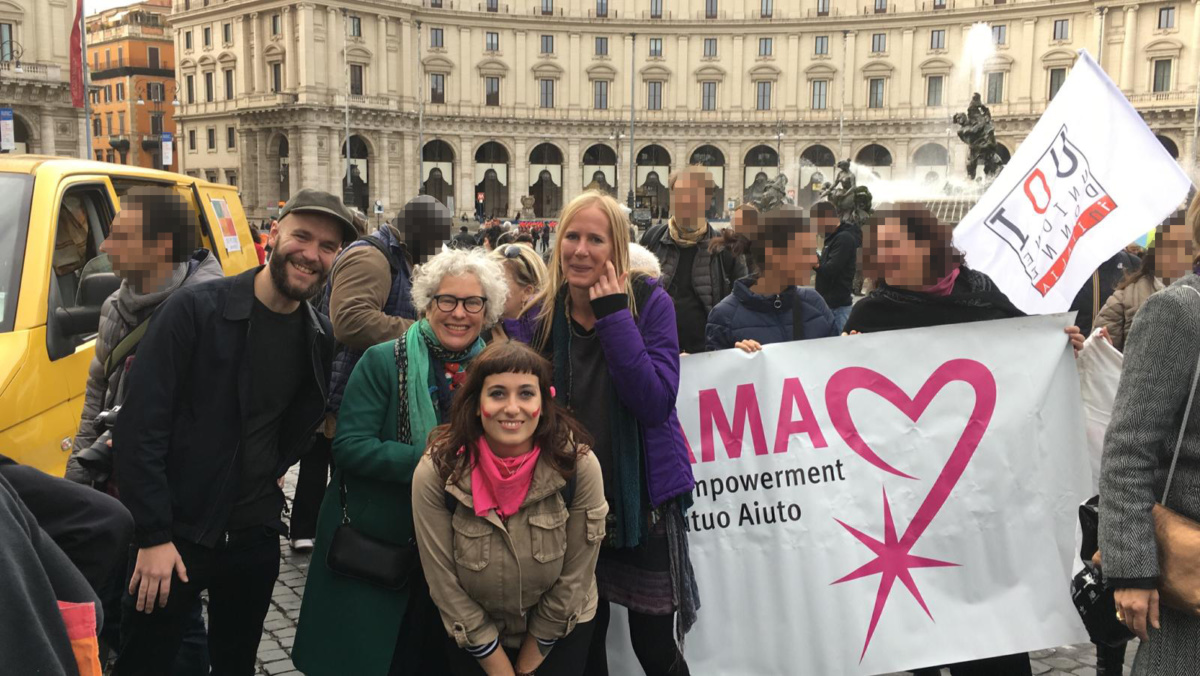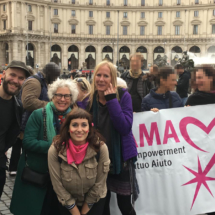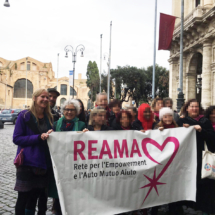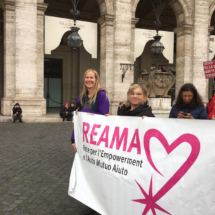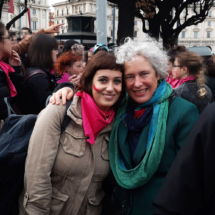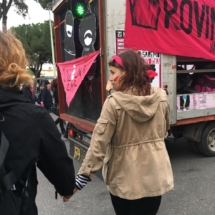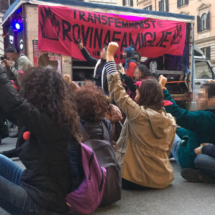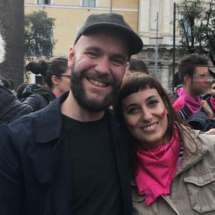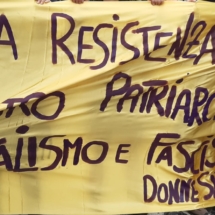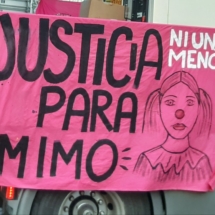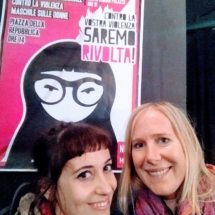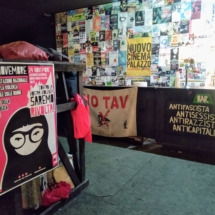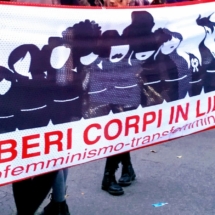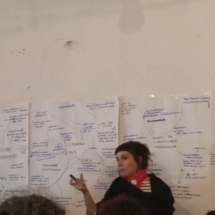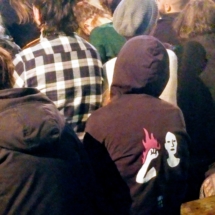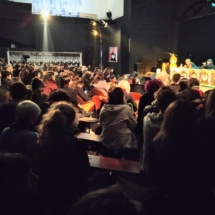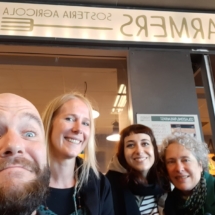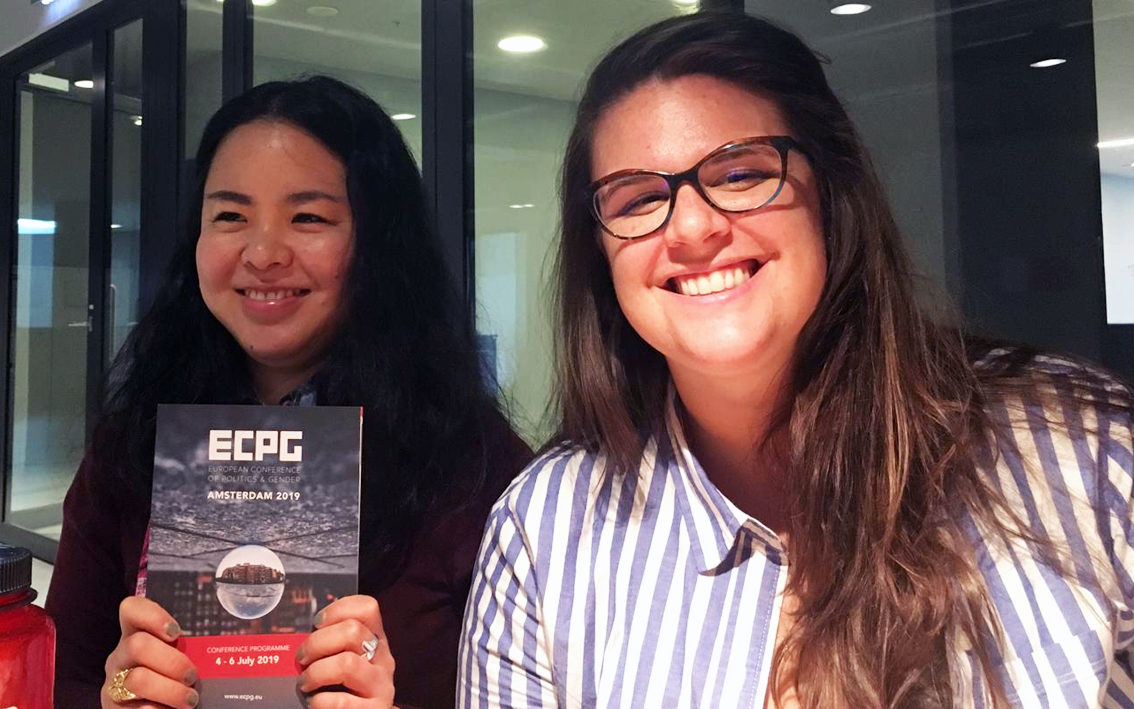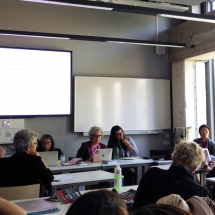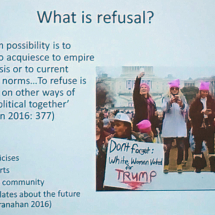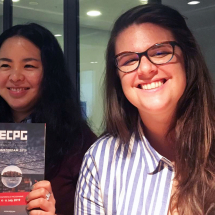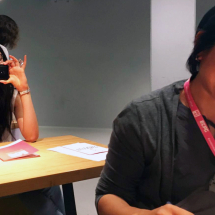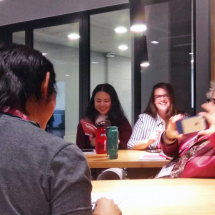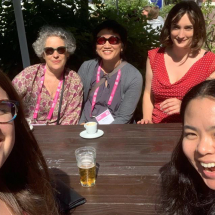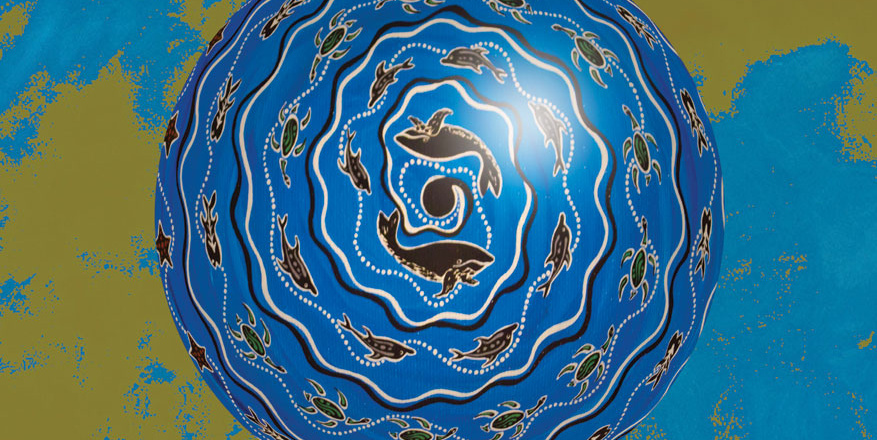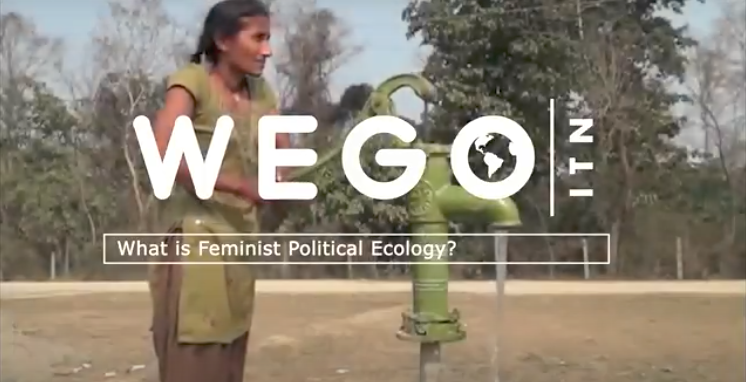Tag: gender
WEGO in action in India
Prof Wendy Harcourt, WEGO project coordinator will be travelling to India to give lectures as part of the WEGO-ITN initiative.
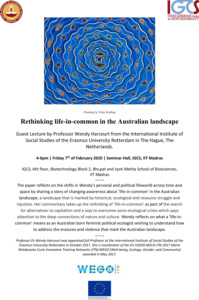
Prof Harcourt gave a lecture on
“Rethinking life-in-common in the Australian landscape”
on Friday, 7 February from 16 to 18 hrs at IGCS Seminar Hall, 4th floor, Biotechnology Building 2, Bhupat and Jyoti Mehta School of Biosciences, Indian Institute Of Technology.
The lecture reflected on the shifts in Wendy’s personal and political lifeworld across time and space by sharing a story of changing awareness about ‘life-in-common’ in the Australian landscape; a landscape that is marked by historical, ecological and resource struggle and injustice. Her commentary takes up the rethinking of ‘life-in-common’ as part of the search for alternatives to capitalism and a way to overcome socio-ecological crises which pays attention to the deep connections of nature and culture. Wendy reflects on what a ‘life-in-common’ means as an Australian born feminist political ecologist wishing to understand how to address the erasures and violence that mark the Australian landscape.
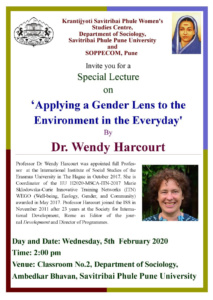
On Wednesday, 5th of February, Prof Wendy Harcourt gave a lecture on
“Applying a gender lens to the environment in the everyday”
at the Women’s Studies Centre and the Department of Sociology of Savitribai Phule Pune University, from 14.00 to 16.00 pm hosted by Dr. Swati Dehadroy and Dr. Anagha Tambe from the Savitribai Phule Women’s Studies Centre and Dr. Shruti Tambe and Prof Hemant Chouhan from the Department of Sociology.
Wendy Harcourt at SPPU in Pune, 5 February 2020
WEGO in Pune, February 2020
WEGO in Chennai, February 2020
Count them in: documentary on gender equality in science
Students at IHE Delft have produced a documentary entitled ‘Count them in’ on gender equality in science featuring Margreet Zwarteveen and Wendy Harcourt.
WEGO at POLLEN 20: ecologies of care
WEGO is happy to announce that our proposals for two ‘Paper Session’ entitled ‘Ecologies of Care I – Politics and ethics of care’ and Ecologies of Care II – Care-full political ecology – with whom, with what and where do we care?’ has been accepted for inclusion in the POLLEN 20 conference.
The Third Biennial Conference of the Political Ecology Network (POLLEN 20) will take place from 24 – 26 June 2020 in Brighton, UK.
The conference theme is Contested Natures: Power, Possibility, Prefiguration
Organiser Name and Contacts:
Wendy Harcourt: harcourt@iss.nl; Enid Still: Enid.Still@uni-passau.de; Jaime Landinez Aceros: jlandinez@stanford.edu and Constance Dupuis: dupuis@iss.nl
Title: Ecologies of Care
Key words: care, gender, feminism, more-than-human, ethics
Session abstract
Recent debates on the politics and ethics of care brings together the politics of gendered bodies and labour, the messy ethics of more-than-human interdependencies, and questions of difference and belonging in alternative ways of being-in-the-world (Harcourt 2017; Puig de la Bellacasa 2017; Singh 2017). These perspectives tease out the invisibility of ‘caring ethics’ and what care means and does in different contexts and different socio-natural entanglements, exploring how practices of care can animate, complicate or make visible such entanglements. These discussions are infused with hope for an alternative, more ecologically sane society but are also critical of the depoliticisation of care as inherently ‘good’ or naturalised. The non-innocence of care and its uneven nature within more-than-human interdependencies are therefore central to these debates (Puig de la Bellacasa 2017). This panel organised by Well-being, Ecology, Gender and cOmmunity – Innovative Training Network (WEGO-ITN) will try to build upon these discussions, expanding notions of care beyond human subjectivities (and yet rooting it in anthropocentric times), through exploring how care emerges in landscapes of extractivist ruins.
Core themes running through the panel will be: what caring practices are emerging from sites of socio-ecological transformation? How are notions and practices of care complicated by their non-innocence in particular sites and contexts? How are more-than-human interdependencies are animated when practices of care take place in extractivist ruins? The panel will look towards how we can repair our world as we seek to ‘interweave’ our bodies, ourselves and our socio-natures in a ‘complex, life-sustaining web’ (Tronto 2017) as we seek to locate some of the many ‘care-ful’ forms of political ecology needed to ‘reappropriate, reconstruct and reinvent our personal and political lifeworlds’ (Escobar and Harcourt 2005). The two panels will look at two main themes: Care in Extractivist Ruins and Care-ful political ecology – with whom, with what and where do we care?
References
- Escobar, Arturo and Wendy Harcourt 2005 “Introduction”, Women and the Politics of Place London: Zed Books. 1-19.
- Harcourt, Wendy. 2017. “Gender and Sustainable Livelihoods: Linking Gendered Experiences of Environment , Community and Self.” Agriculture and Human Values34(4):1007–19.
- Puig de la Bellacasa, Maria. 2017. Matters of Care: Speculative Ethics in More than Human Worlds. Minneapolis, Minn.: University of Minnesota Press.
- Singh, Neera. 2017. “Becoming a Commoner: The Commons as Sites for Affective Socio-Nature Encounters and Co- Becomings.” Ephemera: Theory & Politics in Organization 17(4):751–76.
- Tronto, Joan. 2017. “There is an alternative: homines curans and the limits of neoliberalism”. International Journal of Care and Caring 1: 27-43.
Part I: ‘Ecologies of Care I – Politics and ethics of care’
The first panel ‘Care in Extractivist Ruins’ will focus on how more-than-human interdependencies in sites of extraction are illuminated through practices of care and how such caring practices can become forms of resistance or coping. Some key questions the panel will address are:
- How can caring socio-natural entanglements resist, undercut, refuse logics of colonialism, militarization, and capitalism?
- When and how does extractivism extract, appropriate or exploit care (human, non-human) in local and global sites of climate crisis? e.g. through CSR campaigns that legitimise the extractive regime
- What practices of care emerge in the ruins of extractive landscapes in the global South and how do they contest assumptions around wellbeing?
Panel Participants
Each presentation will have 10 minutes this will be followed by buzz groups among the participants and a Q and A. The discussant taking into account the discussion 15 minutes before the end of the session will ask one question to each panelist who will respond.
Collective Care in Times of Agrarian Crisis by Enid Still (UK), Universität Passau, Germany
Abstract: The agrarian crisis in India has been depicted as one of indebtedness and financial burden, driving thousands of farmers to suicide. This picture is of course inherently partial. The experiences of women farmers and the widows of farmers who have committed suicide trouble the perception of suicides as only an economic ‘problem.’ They reveal a much deeper social malaise, rooted in a politics of land, patriarchy and caste, re-produced by regimes of exploitation and dependency, where the extraction of value from the soil and the extraction of bodies from agrarian communities are deeply intertwined. The perspective of women farmers and farm widows on the crisis have been silenced and invisibilised, their ability to navigate these times thus curtailed, due to both cultural norms that stigmatise widows in multi-layered ways and narrow socio-political categories that define farmers as landowners, predominantly therefore upper-caste men. Through practices of collective care however, the struggles of rural women in India are finding a voice and demonstrating the possibilities for healing degraded lands and a traumatised agrarian community.
Poisoned Landscapes: Stories of Soil Care Amidst War Times by Jaime Landinez-Aceros (Colombia), Stanford University, USA
Beyond Economy: Exploring Care within the Everyday Lives of Independent Oil Palm Smallholders in West Kalimantan, Indonesia by Dian Ekowati (Indonesia), Brighton University, UK
Siti Maimunah (Indonesia), Universität Passau, Germany
Facilitator and Discussant: Giovanna DiChiro, Swathmore College, USA, gdichir2@swarthmore.edu
Part II: ‘Ecologies of Care II – Care-full political ecology – with whom, with what and where do we care?’
The second panel on ‘Care-full political ecology – with whom, with what and where do we care?’ will explore from feminist, interdisciplinary and intergenerational perspective ‘care-full political ecology’ describing different acts of looking after, protecting and providing for the needs of human and non-human others. The papers will look at how care operates in the co-production of genders, natures and bodies as we move towards emancipatory politics of life-worlds.
Panel Participants
Each presentation will have 10 minutes this will be followed by buzz groups among the participants and a Q and A. The discussant taking into account the discussion 15 minutes before the end of the session will ask one question to each panellist who will respond.
Enfleshing Human Rights and the Inter-American Convention On Protecting The Human Rights Of Older Persons by Ana Agostino (Uruguay), Montevideo, Uruguay and Constance Dupuis (Canada), International Institute of Social Studies of Erasmus University Rotterdam, The Hague, The Netherlands
Caring for self and nature: Women and Ageing in Rural Japan by Nanako Nakamura (Japan) and Chizu Sato (Japan), University of Wageningen, The Netherlands
Abstract:
Flower farmers and water flows: caring for and theorizing about troubled socionatures in Maharashtra, India by Irene Leonardelli (Italy), IHE Delft Institute for Water Education, Delft, The Netherlands
Abstract: The paper will look at the everyday practices of care, reciprocity, sharing, solidarity and equity between farmers and natures among flower growers in Maharashtra. Inspired by feminist political ecology studies, I unpack the multiple socionatural relations, practices, experiences and embodied emotions of women farmers growing flowers using waste water coming from nearby industrial areas. By looking at flowers as a product of socionatural interaction (or women farmers-water interaction), I unfold the tensions farmers experience in the everyday in relation to taking care of themselves, of their community and of the nature they inhabit. I develop my narrative as a way to theorize about and care for more sustainable and equitable socio-natural presents (and futures).
Facilitator and Discussant: Yvonne Underhill-Sem, University of Auckland, New Zealand, y.underhill-sem@auckland.ac.nz
More information on the WEGO sessions will follow
#NonUnaDiMeno – WEGO at the demonstration in Rome
WEGOers Wendy, Ilenia, Nick and Anna Katharina were in Rome on the 26th and 27th of November for #NonUnaDiMeno, the international demonstration to stop male violence against women.
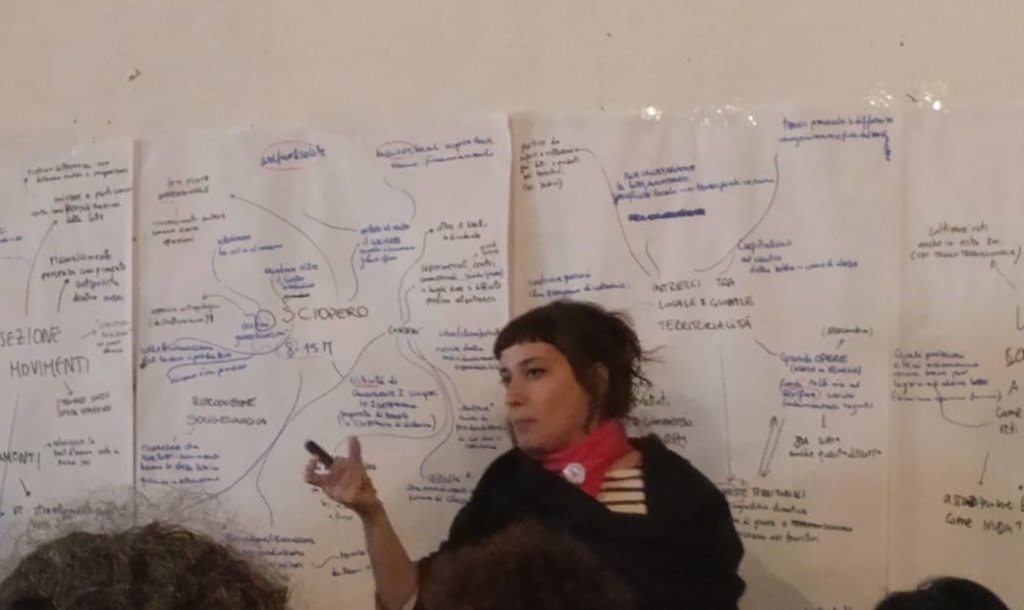
The group joined the demonstration in Rome on the 26th. It was followed by the National Assembly on the 27th where Ilenia led an afternoon session towards next year’s strike on International Women’s day.
The demonstration, used the slogan #NonUnaDiMeno (Not one less), to recall directly the Argentinian demonstrations #NiUnaMenos, and to stand in solidarity with all women in the world that are fighting everyday against discrimination, violence, and for their self-determination.
The group concluded their stay in Rome with a final work meeting.
Undisciplined Environments goes live
Undisciplined Environments – a platform for political ecology research and activism – has launched today, 1 October 2019
This novel effort is a collaboration between the ENTITLE Collective and the WEGO project, as well as other transnational networks – like the Political Ecology Network (POLLEN).
Undisciplined Environments (UE) aims to become an influential crossroads for activists, researchers, journalists and anyone interested in the mutual imbrications of power, society, culture and ecology. Our commitment is to establish UE as a compelling virtual space to share ideas, stories, concepts, methods and strategies for the elaboration of the knowledges and practices needed to build more emancipatory socionatural worlds.
WEGO members Panagiota Kotsila, Ilenia Iengo, Irene Leonardelli, Wendy Harcourt and Stefania Barca are on the editorial collective.
WEGO lead panel discussion at European Conference on Politics and Gender
WEGO was out in force at the European Conference on Politics and Gender which ran from 3 – 6 July 2019 in Amsterdam.
Wendy Harcourt, Gulay Caglar, Chizu Sato, Constance Dupuis , Marlene Gomez and Nanako Nakamura were involved in several panel discussions at the Conference Below are abstracts from some of those panels.
Care and the Commons in Troubling times: confronting whiteness
Led by Constance Dupuis and Wendy Harcourt
Our paper looks at the everyday practice of feminist political ecology as not only practices rooted in one geographical place and culture but also as collective processes that are forming a global community network. We explore how feminist political ecology (FPE) aims to navigate racist structures, gender and class inequalities that determine struggles over rights and resources. Inspired by Donna Haraway’s staying with the trouble, our paper looks at how we confront whiteness in feminist political ecology. We address the ways in which white privilege and colonialism continue to be reproduced and how FPE can engage in critical conversations without centring the white experience.
Analyzing the Politics of the Everyday: A Feminist Political Ecology Perspective
There is ample evidence that neoliberal restructuring has led to precarious living conditions as well as to environmental degradation, both of which negatively affect community well-being worldwide. In response, many alternative initiatives have mushroomed at community level that aim to counter neoliberal policies through changing everyday practices of care and natural resource management. Feminist Political Ecology (FPE) is an approach that analyses these practices by taking into account power relations within different systems of oppression at different scales. With an emphasis on the importance of embodiment, place and scale, FPE aims to unveil the processes through which different actors interact, and the strategies and political mechanisms that community initiatives use to challenge the existing power relations based on exploitation, domination, and conflict. This panel seeks to introduce the theoretical tenets of FPE and to show how FPE contributes to feminist political science. Papers will be analyzing different social movements and initiatives around issues of social and environmental justice, natural resource management and care.
Orientation week

We welcomed our WEGO ESRs at the Coordinating Institute, ISS for their orientation programme from 10 to 14 September 2018. The group was eager to get to know each other, connect, interact and engage in talks and debates about WEGO and FPE. It was a very good bonding experience.
During this week, the ESRs participated in a 3-day writeshop on how to read and write articles. There were plenary discussions and a film on FPE.
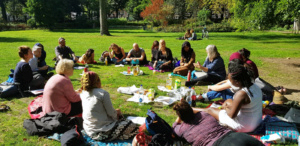
We also organised other exciting and thought provoking sessions. Personal reflections on what brought us to WEGO and our interest in FPE were shared. We talked about our understanding and experiences of our work and activism.
Discussions were held on the fundamental characteristics of FPE. Dowe encounter FPE through gender and development or personal and professional identity questions? Or is it understanding the operation of power and theorising socio-natures? How do issues of gender and women relate to issues of power, knowledge and subjectivity?
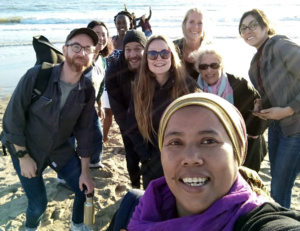
We looked at how we want the WEGO clusters and network to develop over the next three years and where we fit in. We talked about how we can work together to create an inclusive, participatory and safe environment; how we can position ourselves in the project, create knowledge and engage in critical debates. We explored the processes that we want to foster and engage in, internally and externally. How do we share and engage in cultural communication – using verbal and non-verbal language? We looked at the art of communication and how FPE manifests in art and science.
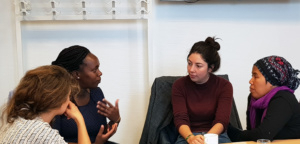
We ended by sharing reflections on the orientation week and looking forward to continuing the interactions and debates.
Introducing WEGO-ITN
Well-being, Ecology, Gender and cOmmunity – Innovative Training Network
1 January 2018 to 31 January 2022
How is gender linked to environmental problems and developmental issues? How are feminist political ecologists working with local communities around the world? How can their activities inform sustainable development policy debates?
With funding by the European Union the Horizon 2020 Marie Sklodowska – Curie WEGO network made up of 20 institutions will host 15 Ph.D researchers creating the first European ITN on Feminist Political Ecology (FPE).
As the first international feminist political ecology research network of its kind, WEGO-ITN aspires to tackle socio-ecological challenges linked to policy agendas. This innovative and path-breaking project will help local communities to build resilient, equitable and sustainable futures. The goal of WEGO-ITN is to provide research that will demonstrate to policy makers how communities actively sustain and care for their environment and community well-being. Ultimately, WEGO will collectively provide important guides to strategies of resilience and sustainability that are required for meeting the SDGs.
The WEGO-ITN is made up of scholar-activists working on feminist political ecology from ten institutions in six European Union countries: Germany, Italy, Norway, Spain, The Netherlands and the United Kingdom and ten institutions from eight countries for training and secondments: Australia, India, Indonesia, Italy, New Zealand, Portugal, Uruguay and USA.


